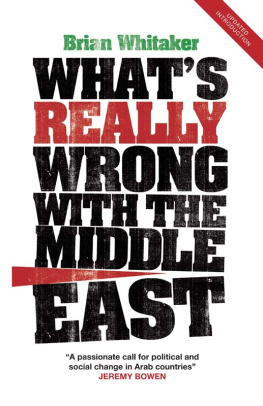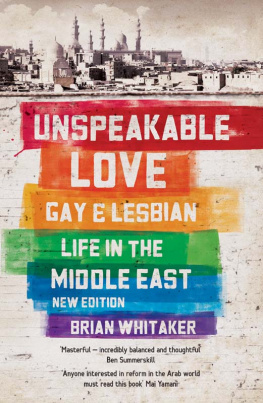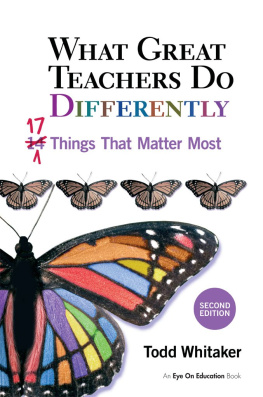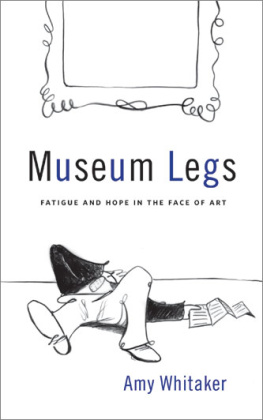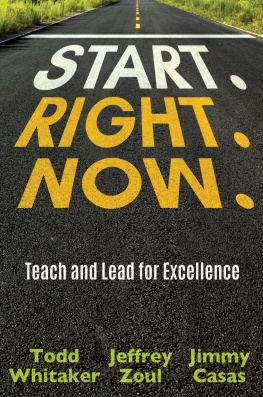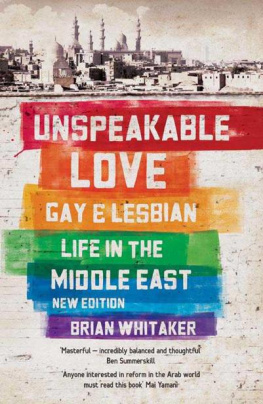Whitaker - What’s really wrong with the Middle East
Here you can read online Whitaker - What’s really wrong with the Middle East full text of the book (entire story) in english for free. Download pdf and epub, get meaning, cover and reviews about this ebook. City: London, Middle East, Middle East., year: 2011, publisher: Saqi, genre: Politics. Description of the work, (preface) as well as reviews are available. Best literature library LitArk.com created for fans of good reading and offers a wide selection of genres:
Romance novel
Science fiction
Adventure
Detective
Science
History
Home and family
Prose
Art
Politics
Computer
Non-fiction
Religion
Business
Children
Humor
Choose a favorite category and find really read worthwhile books. Enjoy immersion in the world of imagination, feel the emotions of the characters or learn something new for yourself, make an fascinating discovery.
What’s really wrong with the Middle East: summary, description and annotation
We offer to read an annotation, description, summary or preface (depends on what the author of the book "What’s really wrong with the Middle East" wrote himself). If you haven't found the necessary information about the book — write in the comments, we will try to find it.
Whitaker: author's other books
Who wrote What’s really wrong with the Middle East? Find out the surname, the name of the author of the book and a list of all author's works by series.
What’s really wrong with the Middle East — read online for free the complete book (whole text) full work
Below is the text of the book, divided by pages. System saving the place of the last page read, allows you to conveniently read the book "What’s really wrong with the Middle East" online for free, without having to search again every time where you left off. Put a bookmark, and you can go to the page where you finished reading at any time.
Font size:
Interval:
Bookmark:
BRIAN WHITAKER was Middle East editor at the Guardian for seven years and is currently an editor for the newspapers Comment is Free website. He is the author of Unspeakable Love: Gay and Lesbian Life in the Middle East (Saqi Books, 2006). His website, www.al-bab.com, is devoted to Arab culture and politics.
Whitaker writes with insight and clarity about the many ills that afflict Arab society [This is a] lively, highly readable and illuminating survey of the countless things that are wrong with the Middle East today. Avi Shlaim, Guardian
Whitaker lays bare almost every aspect of Arab culture, society and politics Whats Really Wrong with the Middle East is principled and direct, not hesitating to criticize the Arab world at large for its failings A call to arms for Arab citizens International Affairs
This is a writer willing to rattle a few cages Detailed and well-documented Huffington Post
Offers a colourful, distinctive and well-informed take on subjects not often broached by western writers when considering the future of the region Northeastern Univeristy Political Review
An interesting and informative book, and a passionate attack on the corrosive effects of inequality. New Statesman
[Should] be required reading by Arab elites from the Atlantic to the Gulf It is one of the most ambitious attempts in recent years by a western writer to analyse what is really wrong with the Middle East. Patrick Seale, Al Hayat
A well-informed book that is sympathetic to its subject without being indulgent towards it. At its heart, [this book] attempts the difficult task of tackling socio-cultural causes of some of the Arab worlds problems while skirting the trap of cultural essentialism Middle East International
Middle East
A full CIP record for this book is available from the Library of Congress.
26 Westbourne Grove, London W2 5RH
www.saqibooks.com
My thanks, in alphabetical order, to those who found time to talk to me specifically for this book: Mahmoud Alhourani, Hossam Bahgat, Kholoud Bidak, Aida Saif al-Dawla, Khaled Diab, Gamal Eid, Kareem Elbayar, Magda Abu Fadil, Hossam el-Hamalawy, Nadim Houry, Ghada Kabesh, Amina Khairy, Jamal Khatib, Ghassan Makarem, Karim Makdisi, Nesrine Malik, Jehad al-Omari, Salam Pax, Basem Sakijha, Abdellah Taia and Nasr Abu Zayd.
For reading early drafts and making helpful comments, I am particulary grateful to Khaled Diab, Nesrine Malik, Ann Elizabeth Mayer, David Shariatmadari and Martin Woollacott plus, of course, my patient editor at Saqi Books, Anna Wilson.
Since the main object of this book is to stimulate debate, readers can find further discussion on the relevant section of my website, www.al-bab.com/whatsreallywrong. The footnotes are also available there in an online version which provides easy access to web pages mentioned in the text.
AS THE YEAR 2011 arrived, Tunisia was in the midst of a popular uprising. What had begun with a small confrontation between the authorities and an unlicensed fruit seller in a provincial city culminated four weeks later with President Zine El Abidine Ben Ali fleeing the country after twenty-three years of increasingly authoritarian rule.
The overthrow of Ben Ali sent shock waves throughout the Middle East, stirring speculation about which of the regions long-entrenched regimes would be next. An answer came very swiftly as the streets of Egypt also exploded against the twenty-nine-year presidency of Hosni Mubarak. Tunisia inspired other protests too in Algeria, Jordan, Libya and Yemen as Arab leaders anxiously reconsidered their survival prospects.
The events in Tunisia came as a surprise especially the speed of Ben Alis fall but they were not entirely unforeseen. The warning signs had been around for a long time: the resentment of Arab youth over jobs and stifled aspirations, and the anger over corruption and favouritism, over repression and government attempts to control the minutiae of peoples lives. Above all, there was a widening gulf between governments and those governed and a sense that nothing would change unless people took matters into their own hands. Sooner or later, the long pent-up frustrations were going to reach boiling point.
These were among the problems that I sought to highlight when Whats Really Wrong with the Middle East was first published in 2009. They are as relevant today as they were then if not more so and they are not going to be resolved simply by changing a few old faces at the top (though that may help).
To bring real freedom to the Arab countries, political change has to be accompanied by social change, too; they go hand in hand. That was one of the mistakes of former president George W. Bush in his calls for democracy and regime change in the Middle East calls that were directed mainly against the regimes deemed hostile towards the United States. But we have only to look at the mess in Iraq following Saddam Husseins overthrow to see the folly of pinning too many hopes on toppling tyrants: change in the Middle East is a lot more complicated than that.
Governments are products of the societies they govern, and in Arab countries, it is often society as much as the government itself that stands in the way of progress. In Kuwait, for instance, it was not the hereditary Emir who resisted granting votes to women but reactionary elements in the elected parliament and there are plenty of similar examples.
Social discrimination is the greatest of all ailments facing Arab societies today, Hussein Shobokshi, a board member of the Mecca Chamber of Commerce, observed during a TV debate. It creates government in its own image but it also poisons the mentality for reform and definitely for democracy While governments have been introducing little windows of opportunity to reform, there has been great popular resistance against equality based on gender and race from the people.
Khaled Diab, an Egyptian-born journalist, summed up the problem more pithily when he told me: Egypt has a million Mubaraks. In other words, the Mubarak way of doing things is not confined to the countrys president; it is found throughout Egyptian society, in business and even within families.
In order to understand what is really wrong with the Middle East we have to look beyond the regimes to society as a whole and this instantly shifts our perspective. The problem is no longer a simplistic one of good versus evil, or tyrants versus the rest. Instead, we see people who are not only oppressed and denied rights by their rulers but who also, to varying degrees, are participants in a system of oppression and denial of rights. Thus, the oppressed often become oppressors themselves, victims become victimisers too, and acknowledging that fact is the first step towards a solution.
Next pageFont size:
Interval:
Bookmark:
Similar books «What’s really wrong with the Middle East»
Look at similar books to What’s really wrong with the Middle East. We have selected literature similar in name and meaning in the hope of providing readers with more options to find new, interesting, not yet read works.
Discussion, reviews of the book What’s really wrong with the Middle East and just readers' own opinions. Leave your comments, write what you think about the work, its meaning or the main characters. Specify what exactly you liked and what you didn't like, and why you think so.

